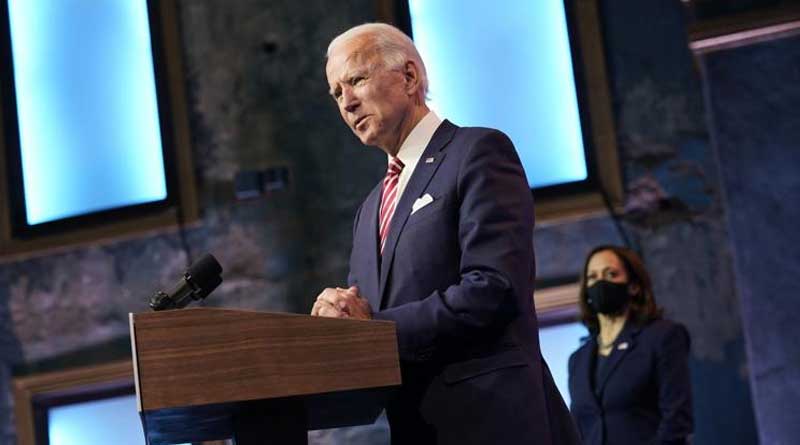Photo- Presumptive President-elect Joe Biden, accompanied by presumptive Vice President-elect Kamala Harris, speaks about economic recovery at The Queen theater, in Wilmington, Del., on Monday, Nov. 16, 2020.
Photo Credit- Andrew Harnik / AP
By Ross Marchand [via The Center Square] –
Even after President Donald Trump noisily departs the Oval Office, poisoned politics and noxious claims will continue to foul the swamp.
Americans ought to expect continued, baseless claims that the past election was illegitimate and the rightful president resides in Mar-a-Lago. But left-leaning politicians are peddling their own dangerous claims ranging from net neutrality fearmongering to United States Postal Service (USPS) conspiracies. It’s odd that commentators on the left are branding their ideological opponents as “post-truth” given the repeated conspiracies and failed predictions floated by prominent left-leaning figures.
No party or ideology has a monopoly on truth, and insinuations otherwise are downright dangerous to democracy. As the clear leader of the Democratic Party, presumptive President-elect Joe Biden has an urgent responsibility to correct the misinformation swirling about on the left side of the aisle.
It’s no secret that progressive commentators and politicians love to brand their right-of-center counterparts as truth-challenged. Democratic candidates are more likely to run on explicitly “pro-science” messaging and talk about the “post-truth” GOP to highlight their own supposed fealty to the facts. In November, CNN commentator Brian Stelter asserted that the Biden campaign “leads with facts” while Trump’s campaign leads with feelings. Stelter neglected to mention that Biden and the left side of the aisle have a proclivity of their own for stretching the truth.
For example, the left’s doomsday predictions regarding the repeal of Title II telecommunications regulations in 2017 never materialized. These Obama-era rules treated the digital domain as a utility and made it difficult for internet providers to provide free services to low-income consumers. When it became clear that Federal Communications Commission (FCC) Chairman Ajit Pai would be leading the charge to kybosh these regulations, Democratic politicians and liberal commentators predicted the death of the internet.
Senate Democrats warned that, “If we don’t save net neutrality, you’ll get the internet one word at a time.” Rep. Frank Pallone (D-N.J.) bizarrely asserted that, without Title II protections, internet providers would choose your content rather than the other way around. Over the years, former Sen. Al Franken (D-Minn.) called net neutrality the “free speech issue of our time” and warned that “they’re [net neutrality opponents] after the internet.” Well, it’s been nearly three years since the vote to end Title II internet restrictions, and…the internet is faster than ever before. And while gaps to internet access are stubbornly persistent, the FCC is helping close the digital divide – with gains in access concentrated among households earning less than $75,000 per year.
Liberal commentators and politicians didn’t seem to learn their lesson from the Great Net Neutrality Freakout of 2017. In August of 2020, conspiracies abounded that new Postmaster General Louis DeJoy was in cahoots with President Trump to neuter the USPS ahead of the 2020 election. Following reports that the USPS was removing mail collection boxes, Biden claimed, “They’re going around literally with tractor-trailers picking up mailboxes. … You oughta go online and check out what they’re doing … I mean, it’s bizarre!”
Even his former boss (along with scores of lawmakers, commentators, and even a famed musician or two) was not above falling for wacky mail-related conspiracy theories. But the purveyors of postal-palooza failed to mention that the USPS removes some 2,000 collection boxes from street corners each and every year. DeJoy somewhat expedited this removal process, taking nearly 800 boxes out of commission over the summer. But this removal effort was by no means unprecedented and merely served to redirect carriers’ efforts toward busier mail routes ahead of the election. And despite ludicrous predictions that the USPS would be unable to handle the influx of election mail, the agency did just fine in prioritizing and quickly delivering mailed ballots to and from voters.
As Biden prepares to enter the Oval Office, it’s difficult to predict what the next conspiracy theory will be or where it will come from. But one thing’s for sure: no party or ideology has a monopoly on truth or fiction. America’s new leaders must do their best to cut through the slew of misinformation, and soberly evaluate all the facts when crafting policy.
Ross Marchand is a senior fellow for the Taxpayers Protection Alliance.


